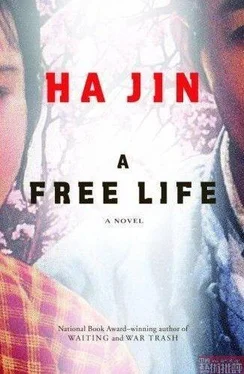Now Nan recognized him-the young poet, Sam Fisher's friend, whom he had met several times in New York. Delightedly Nan shook his hand. "What brought you here, Dick? I didn't recognize you because your hair is short now. You look so young zat I thought you were a student."
"Thanks. I took a job at Emory." Dick rested his elbows on the counter.
"What kind of jawb? Teaching?"
"Yes, poet in residence."
"You teach how to write poetry?"
"Yes, plus literature. Sam told me you had opened a restaurant in an eastern suburb of Atlanta, so whenever I saw a Chinese restaurant, I'd pop in to see if I could run into you."
"Sanks for looking for me."
"I'm so happy to find you."
After introducing Dick to Pingping, Nan led him to a booth and they both sat down. He asked his wife to make some appetizers and Tammie to bring over a pot of Dragon Well tea, a delicate green tea, not the red stuff offered to their customers. By now Pingping could cook as well as Nan, though she usually worked at the counter as the hostess and cashier. The two friends resumed conversing. Now and again they looked at each other and tipped their heads back laughing as if someone had cracked a joke nobody but they two had caught.
"How's Sam?" asked Nan.
"He's okay, but he drinks too much."
"I didn't know he was bibulous."
"Come again?"
"He's bibulous."
"Oh, yes, he's fond of alcohol."
"How about his boyfriend, Min Niu?"
"Min doesn't drink much. They had a big row the other day. Min moved out, then Sam apologized and Min went back." "So they're still a cahple?" "Of course, Sam depends on Min."
Nan was surprised that Min Niu had dared to quarrel with Sam Fisher, the famous poet.
"How about you?" Dick went on.
"I'm doing all right. We bought a house nearby and also zis business."
"This is impressive. I can see that you're becoming an American capitalist."
"Come on, I still have a mortgage to pay. How can you call me zat?" "Okay, you're not rich yet, but you're on your way to realizing your American dream, aren't you?" "I just want to be independent."
Tammie came and put the teapot and two cups on the table. Dick tilted his full head of hair and said to her in his one-toned Mandarin, "How do you do?"
She didn't reply and instead tittered. She stared at him, her round eyes intense and widened; her lips parted, then twitched a little. Still she didn't say a word. Dick lifted the cup of tea Nan had poured, and sipped. "Hmmm, excellent tea. Thank you!" he said to her.
She giggled and glanced at his pointy chin and hairy neck. "It's Dragon Well, this year's fresh leaves," she told him.
Pingping called to Tammie from the kitchen, so the waitress turned away. The two men went on talking about Emory, which Nan had heard was called "the Harvard of the South." Dick said the university had received a lot of funding from Coca-Cola and paid him well. He also mentioned that the previous year he'd had a book of poems published, his second, which had garnered numerous positive reviews. That was why another college had also made him a job offer. Nan was impressed, glad Dick had moved here.
Tammie came again with two plates, one loaded with spring and egg rolls and the other with fried fantail shrimp. The moment she placed them on the table, Dick picked up a spring roll and took a bite. "This is delicious, Nan. I've heard you're an excellent chef. I'll come and eat here every once in a while."
"You're always welcome. Bring your friends too."
Dick went on to tell him about his move to Atlanta. He had already settled down, having bought an apartment in the Buckhead area. Today he had gone to Lake Lanier, and on his way back got off the interstate and drove through the suburbs. He was lucky to come into the Gold Wok, though he didn't expect to find Nan so easily. He said, "What a miracle. I thought I'd be a total stranger in this redneck country."
"Now you have me here. In fact, Atlanta is not a bad place. Many people from southern China feel more at home here zan in New England."
"You're kidding me-why?"
"Zer climate is very similah to their home provinces, and houses are not expensive."
"I can see that. To be honest, this is the first time in my life that I can afford a condo. There are lots of restaurants and shops in Atlanta. Quite a convenient place to live."
"Have you been to a farmers' market yet? I never saw so many fruits and vegetables before."
"No, I haven't."
"Go to zer Dekalb Farmers' Market. It's absolutely fantastic."
"Oh, I love this shrimp. Thank you, Mrs. Wu." He waved at Ping-ping, who was clipping coupons at the counter.
She replied, "I'm glad you like it. Just call me Pingping. I didn't change last name after we marry."
"Sure. Thank you, Pingping," Dick said loudly.
They all laughed, Tammie included, and then the two friends resumed their conversation. They talked about Bao Yuan, the painter-poet and editor of the journal New Lines, which was defunct now. Dick said Bao was thinking of leaving New York, though his paintings had begun to sell. Actually, he had just held a one-man show in a gallery in Soho, which turned out quite successful and sold many pieces of his work. Still, Bao felt he couldn't continue living in New York and had been looking for a job elsewhere. Nan knew that would be difficult, since that fellow spoke little English and would make no effort to learn it. It was a shame that he had lived with Wendy for almost a year and still couldn't speak a correct sentence. As people believed, the best way to learn English was to do it in bed with a native speaker, but Bao had simply wasted the opportunity. If he refused to change, there would be no way he could survive in America. "He's too smart," Nan told Dick.
"How do you mean?"
"He had good opportunities, but his mind couldn't focus. He depends too mahch on cleverness and doesn't work hard."
Dick agreed. Then, as if remembering something, he said, "Sam told me you were still writing poetry. How's it going?"
"Oh, I haven't done mahch lately, but I've kept lawts of notes. I'm still trying to figure out how to use zem."
"Do you write in Chinese or English?"
"I haven't written a lawt since I came here, to be honest."
"I remember Sam once urged you to write in English. You should try. Your English is excellent."
"I don't think I can." "Why can't you?"
"I don't know anybody who has written significant poetry in an adawpted language."
"That's not true. How about Charles Simic? He came to this country in his teens and became a marvelous poet."
"Who?"
"Charles Simic."
"I have never heard of him, but I'm going to look at his work."
" Nan, you should be bolder. Fuck the bunk that says you can't write poetry in your stepmother tongue. If nobody can, then you'd better try harder. That will put you in a unique position, to make yourself original. To tell the truth, I was quite amazed that your English has improved so much. You speak more fluently than before."
"Sanks for your advice. By zer way, what's 'bunk'?"
Dick gave a belly laugh. "You're so earnest. It means 'nonsense,' the abridged form of 'bunkum.' "
"I see," Nan said, not knowing that word either. His lips stirred as if he were tasting his own words and reluctant to let them out.
After three o'clock some customers came in, so Dick took his leave. He and Nan exchanged phone numbers, and he promised to come again.
DICK'S presence changed Nan 's life somewhat. Every week the poet would come to eat at the Gold Wok at least once. Nan always did his best in cooking whatever he ordered, and together they'd talk about news, poetry, books, movies, and Buddhism. Nan didn't know much about the religion, while Dick had been studying a bilingual volume of the Lotus Sutra. He would bring along the book and ask Nan about the meanings of some Chinese phrases that he suspected might have been corrupted through the translation, though he respected the group of translators named Silent Tongues.
Читать дальше












